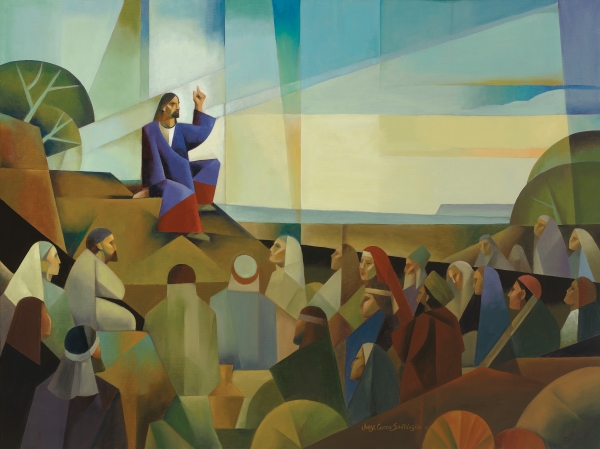Jesus' Alternative Vision

The Rev. Andria Skornik
Sermon for All Saints Day 2020
Recently, I’ve been interested in reading past presidential speeches. I’m sure it has to do with the historic moment we’re in — 8 months into a pandemic and nearing one of the most anticipated and controversial elections. Naturally, it’s made me wonder about other challenging times in our nation’s history and how we’ve made it through.
From FDR’s inaugural address on “fearing nothing but fear itself” during the Great Depression, to Eisenhauers, “Atoms for Peace” speech proposing a reduction of US and Soviet Union nuclear stockpiles, to Reagan’s consoling the nation in the aftermath of the Challenger to Obama’s addressing racial divisions with the audacity to hope. Not only do these speeches give a window into what was happening at the time, but they also give vision, direction, an appeal to our better selves, a way forward.
They are in fact the very lens through which we should be reading this morning’s gospel. The Beatitudes, which is the opening of Jesus’ Sermon on the Mount, is a well known passage and one that we’ve likely heard before. As such, we may be tempted to look at it as merely a collection of nice sayings. A good teaching among many, But it was so much more than that.
It came at a pivotal moment in their history. A time of unrest when violent uprisings were not uncommon. Many of the people gathered there that day would’ve been poor, rural peasants, people who were tyrannized by their government, whose religious institutions were corrupt who had little to no options for improving their situation, and who probably came to the mountainside that day looking for answers.
To that group, Jesus began by saying, “blessed are the poor in spirit.” or in Luke it’s stated simply as “Blessed are the poor.” Just think about that for a moment. It’s not the likely way to begin a speech. It’s not the reality many of us know. We live In a world that says blessed are those who have it all, and that poverty, sadness, or any kind of lack is to be looked down on. But here Jesus says otherwise. He asserts that God looks with favor on the poor and the poor in spirit. He calls his audience to rethink blessing in a way not determined by capital or status.
He goes on with other groundbreaking ideas. In a world that says blessed are the powerful, the ones not afraid to take what they want, the ones in the spotlight, Jesus says blessed are the meek, the humble; those whose work no one knows about, who serve others and make space for others. Theirs is the honorable position.
In a world that sees aggression as strength and violence as the only way forward, Jesus says blessed are the peacemakers; the ones committed to non-violent solutions and a win for everyone.
In a world where morality isn’t often rewarded, and justice is a low priority, Jesus says, blessed are those who long for justice and doing the right thing like it’s necessary for survival.
And in a world afraid of death and loss, where people look away from these things and go to great lengths to avoid them, Jesus says blessed are those who mourn, the ones grieving, the ones who have lost something. Because, as he knew and would come to know intimately, their sorrow was not forever, but was destined for resurrection and reunion.
That day on the mountainside, Jesus outlined a new vision for the world, which was GOD’S vision for the world. It was the antithesis of the empire and the values of the status quo. And it didn’t require the government or those in power to give it their blessing or get on board. Essentially he was saying this kingdom begins in you right now In your heart. In your actions. It’s a way forward that can begin in you this very day.
We, the church, are the body of people formed around this alternative vision. We carry it in our hearts. We seek to bear it out in our actions. We order our lives around it so that our families and institutions look more like it. We steward its message, passing it on to the next generation, so that it’s not forgotten. We do it in a worshipping community where we can be supported in fellowship, prayers, studying scripture and the breaking of bread.
Though churches and denominations have not always done this, especially when we’ve sought alliance with empire; forgotten our call to the poor and most vulnerable; neglected to serve the neighbor and the foreigner; or have sought money or power or comfortability more than the way of Jesus, it still remains the case that the church universal is and will always be about the vision of the Beatitudes.
In every age, we are called to rally around this vision, which is no more true than right now. Today, on All Saints Day in the year 2020, many of us are looking for vision and direction. It’s been a year of exceptional challenges, and now as we are two days away from the election, many people are bracing for what comes next. As I’ve read in several articles, people on both sides of the political spectrum are afraid of what will happen if the other candidate wins. Not disappointed. Afraid. And we’ve heard no matter the outcome, there is the possibility of protests outside agitators, confrontations and violence. This is a tense space to live in as a society.
But no matter what happens on Tuesday or in the days that follow, as Christians we know our direction already. We have God’s vision. Christ gives us the way forward. It is a way that doesn’t depend on how good the economy is. The greatness of our nation. It meets us at our lowest point. And in our high times it calls us to reach down and lift others up. It is God’s kingdom coming to earth wherever we are. Wherever it exists in our lives. And wherever we help make it possible for someone else.
As the church, we have been called to carry Jesus’ message with us and let this vision be what sets our course and defines who we are. Which means our lives are going to look different. If you order your life based on what the beatitudes say is blessed, it’s going to look different. If you are living God’s blessing rather than that of the status quo, it’s going to look different. It may not be flashy, but will be honest. As our All Saints Day Litany described it, it is a life marked by good works, humility, simplicity and peacemaking, one that’s aligned with our true selves and is the essence of living well.
I don’t know what’s going to happen on Nov 3. But I do know that either way we’re gonna need people who are doing the things that Jesus taught us: loving the poor, caring for one another, striving for justice and healing where there has been division and abuse, living from a place of compassion and humility and a sense of our interconnectedness. These attributes will be needed in our country no matter what.
Let us remember today we have a vision. We have direction. We have reason for hope. Let us come together around these dreams God has revealed to us in Christ. With one another. With like-spirited people across the country and across the globe. With saints from every generation.
Amen.
Tags: Sermons
